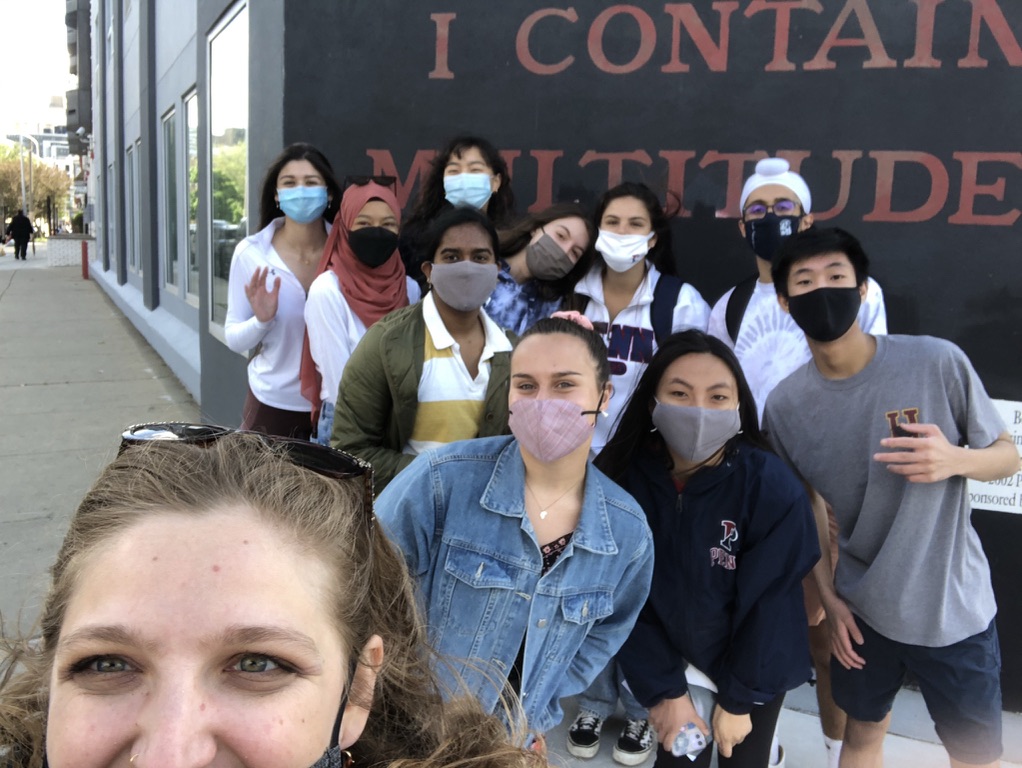Writing and My Journey to Mongolia
By: Dhivya Arasappan, CAS ’24

Dhivya’s class taking the opportunity to meet in-person.
In Spring 2021, Penn Global Seminars (PGS) shifted to a Collaborative Online International Learning (COIL) model as travel restrictions associated with the COVID-19 pandemic continued.
When I was thinking about classes for the spring semester, I did a lot of research about writing seminars. But in reality, all it took was one look at the name of the course (Severe Climate Change and its Impact on Mongolia!), and I hit register. Little did I know that I’d enrolled for a PGS-COIL course or what that would even mean.
And when January 2021 rolled around, I was settling into my first few days of virtual classes and living in the Quad, excited to finally be on campus. If you had asked me then, I likely would have told you two things about me and writing—one, that I had a love/hate relationship with writing. While I loved the thrill of drawing different ideas together, I often delayed starting and didn’t give myself enough time to reflect between drafts. The second was that after struggling a bit with my first foray into college-level academic writing in the fall, I was eager to get a better grasp on how to approach different writing assignments and create a flexible research and writing process to rely on.
But in all honesty, I gained so much more through this PGS-COIL course.
I mean, how often do you get to hear, first-hand, from experts and scientists working on the problems that you’re digging into for your white paper or op/ed? Hearing from Aza Tsogtsaikhan, a Mongolian air quality activist who founded Breathe Mongolia over Zoom, was a real turning point in the class for me. I was drawn in and driven to explore the multiple aspects of climate change from economic to social impacts in my white paper and understand the interconnected web of migration, urbanization, and the poor air quality in Ulaanbaatar, the capital city of Mongolia.
At the same time, with such a multifaceted issue, there were several perspectives to consider. One panel discussion brought together speakers from various backgrounds that informed their views on the problems Mongolia is facing and potential solutions. Hearing from scientist Anarmaa Sharkhuu and historians like Dotno Pount was a way to learn about the diversity of thought regarding the drivers of climate change and societal impacts, which I wouldn’t have gotten looking for articles online. And these discussions genuinely helped to inform my understanding of the issues and my white paper.
And overall, as an expressive and excitable person, particularly when I stumble upon something I can’t stop thinking and talking about, I keep digging, and climate change in Mongolia was one of those things. In learning about the multifaceted(!) problems Mongolia faces, from air pollution, health issues, and energy concerns to developing a sustainable future with grassroots level organizing, I loved seeing the connections and putting the pieces together to see the larger picture.
Through class discussions and expert panels, I began to realize that writing can be a communal and collaborative process. It doesn’t always start when you first open up a blank document and begin typing. My writing process began in conversations with classmates while asking questions and engaging with experts and activists doing the very work I was writing about. And in our virtual classroom, I found so much support from Professor Mac and my classmates.
Now, as a sophomore settling into my first “real” semester at Penn (and running from one end of campus to the other), I’m realizing just how much I’ve taken away from the writing seminar.
I’ve come out feeling more capable of tackling challenges in academic writing—not just “doing” writing assignments. Instead, I’m deeply engaging, exploring, and putting different ideas in conversation with each other through writing.
Perhaps the biggest thing I learned from Professor Mac is that “done is better than perfect.” Putting my thoughts and ideas down on paper helped clarify my direction, goals, and questions and ultimately, moved my writing process forward. Now, even as writing continues to challenge me, I’ve also grown to love the process, start to end.